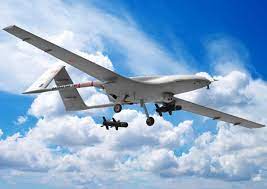The United States has criticized Turkey for selling armed drones to Ethiopia, where two sources familiar with the situation say there is mounting evidence that the government has used the weapons against rebel fighters.
According to a senior Western official, Washington has “profound humanitarian concerns” about the sales, which could violate US restrictions on arms sales to Addis Ababa.
The year-long conflict between Ethiopia’s government and the leaders of the northern Tigray region has killed thousands of civilians and displaced millions, making it one of Africa’s bloodiest conflicts.
During a visit to Turkey last week, US envoy to the Horn of Africa Jeffrey Feltman “raised reports of armed drone use in Ethiopia and the attendant risk of civilian harm,” according to a State Department spokesman.
Washington expressed its displeasure at a few meetings, according to a senior Turkish official, while Ethiopia’s military and government did not respond to detailed requests for comment.
Turkey, which sells drones to a number of countries in Europe, Africa, and Asia, has dismissed accusations that it plays a destabilizing role in the continent, claiming that it is in contact with all parties in Ethiopia to encourage negotiations.
Last week, the United Nations agreed to establish an independent investigation into human rights violations in Ethiopia, a move that Ethiopia’s government strongly opposes.
Tigrayan rebel forces announced on Monday that they were evacuating from several northern regions in response to government gains, and demanded a no-fly zone for drones and other hostile aircraft above Tigray in a letter to the UN.
In May, the US State Department imposed restrictions on defense product exports to Ethiopia’s armed forces.
Though no sanctions have been imposed, the White House authorized sanctions against those involved, even indirectly, in practices that jeopardize stability, escalate the crisis, or hinder humanitarian aid in the country in September.
The US Treasury, which has extensive economic sanctions authority under the executive order, has refused to comment on whether penalties could be imposed on Turkey.
As part of its 2022 budget planning, the Turkish foreign ministry looked into how drone sales would affect US foreign policy, according to a senior Turkish official.
“The US has expressed its displeasure with Turkey’s drone sales…but Turkey will stick to the policies it has established in this area,” the source told reporters.
Ankara has no intention of interfering in any country’s internal affairs, according to a second senior Turkish source from the defense ministry.
According to figures from the Exporters’ Assembly, Turkish defense shipments to Ethiopia increased to about $95 million in the first 11 months of 2021, up from virtually nothing the previous year.
DRONES AT WORK
Ethiopian government soldiers questioned by reporters in Gashena, a hilltop village near the front lines of the war, said a recent government operation was successful after reinforcements arrived and drones and airstrikes were used to target Tigrayan positions.
There were destroyed tanks and armored anti-aircraft trucks, according to reporters. Satellite imagery and other evidence provided “obvious indicators” that drones were being utilized, according to a foreign military official located in Ethiopia, who estimated that up to 20 were in use. It was unclear how many were made in Turkey.
“Surveillance drones are having a stronger impact…and are really beneficial,” the source claimed, adding that the conflict’s guerrilla nature rendered armed drones ineffective.
“I know Turkish soldiers were here at one point,” the diplomat added when asked if other countries had contributed drone operators.
Officials from Turkey and Ethiopia have not publicly confirmed the sale of drones, which was first reported in October, and Turkey’s foreign ministry has not responded to a request for more information.
Last week, it was reported that US ambassador Feltman and Ethiopian Deputy Foreign Minister Sedat Onal reviewed developments in Ethiopia, Somalia, and Sudan.
Ethiopia has also purchased drones from the United Arab Emirates, which has declined to comment on possible US concerns. Feltman was also set to travel to the United Arab Emirates earlier this month.
EXPANSION OF THE TURKISH
Ankara has poured military equipment into Africa and the Middle East under President Tayyip Erdogan, including training armed forces in Somalia, where it has a base.
Last year, the Turkish military employed its Bayraktar TB2 drones successfully in Syria, Libya, and Nagorno-Karabakh, generating interest from purchasers around the world in a field dominated by American, Chinese, and Israeli companies.
Ethiopia is free to buy drones from anywhere, according to a Turkish foreign ministry spokesman in October. Last week, Foreign Minister Mevlut Cavusoglu stated that cooperation with Africa is based on mutual benefit.
Allies of NATO the Turkish purchase of Russian missile defenses and US support for Kurdish fighters in northern Syria have strained relations between Washington and Ankara.
“Now is the time for all outside actors to press for negotiations and end the war” in Ethiopia, according to a State Department spokesperson.
Ankara has responded to US concerns by attaching humanitarian provisions to the Ethiopia deal and requiring signed undertakings outlining how drones will be used, according to the Western official, who requested anonymity.




















